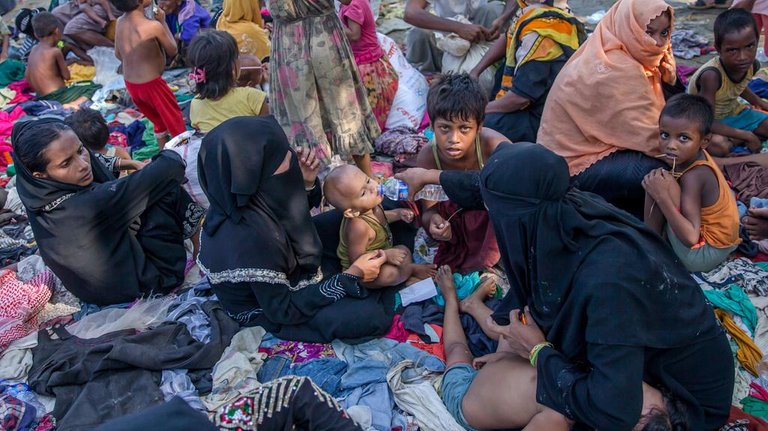A SENIOR US official visiting Maynmar specifically to discuss the Rohingya issue may not be allowed in to northern Rakhine state, scene of the escalating violence against the Muslim minority.
Patrick Murphy, deputy assistant secretary of state is due to visit Sittwe, the capital of Rakhine state, and also meet government leaders in the national capital, Nay Pyi Taw. But Reuters reported that Tin Maung Swe, the state government secretary of Rakhine, had said the northern part of the state was off limits to Mr Murphy.
"Not allowed," Tin Maung Swe said, when asked if Mr Murphy would be going to Maungdaw district, the town which is at the heart of the violent military crackdown which has sent 400,000 Rohingya Muslims fleeing into Bangladesh — a situation that the UN has condemned as a "textbook example of ethnic cleansing."
Mr Murphy will voice Washington's concerns about the Rohingya and press for international aid to be allowed into the region. As witnesses on the Bangladesh side of the border reported seeing huge banks of dark smoke billowing up over Myanmar territory, tens of thousands of people were believed to be in hiding in the Rakhine hills or still making their way to the border having fled their home amid what Amnesty International has deemed a “mass-scale scorched earth campaign” by Myanmar security forces
International aid organisations have been excluded from the region leaving hundreds of thousands of vulnerable people without vital deliveries. Even before the current violence many people in the desperately poor region were already on the verge of starvation and reliant on aid.
The clearance operations were launched on August 25 after the Arakan Rohingya Salvation Army (Arsa) launched deadly attacks on security posts in the region.
The area has been largely cut off to outsiders since the attacks began, making it almost impossible to verify the full extent of the alleged atrocities, but at least 1000 people are estimated to have been killed according to the UN special rapporteur for human rights. Satellite evidence shows entire villages and thousands of properties have been razed to the ground.
The country's de facto leader, Nobel Peace prize recipient Aung San Suu Kyi — who herself spent 15 years under military house arrest — has been vilified for ignoring the crisis and pulled out of attending the UN general assembly. But in a telephone call with US Senate majority leader Mitch McConnell, one of her long-time supporters, she said she was working on getting access for humanitarian organisations, particularly the International Red Cross, which operates under a strict “neutrality” policy and does not make public observations on what it witnesses while delivering aid. However representatives of the UN and other international NGOs fear they will be permanently barred from the region.
The UN has had an increasingly fraught relationship with the Myanmar government which insists that the no large scale atrocities have been perpetrated by its security forces, and blames arson attacks on Arsa. Myanmar has refused to co-operate with an official UN investigation into earlier findings that similar military operations after insurgent attacks last October amounted to “crimes against humanity”.
Even Russia, which has referred to "terrorist" attacks in Rakhine, has raised concerns about the humanitarian situation.
"We cannot discard the fact that it was triggered by terrorist activities," Russia's UN ambassador Vassily Nebenzia. "We are concerned with what is happening. … We are looking forward to an early cessation of the violence and to elevating the humanitarian situation of the population."
The UN refugee agency said the Rohingya arriving in Bangladesh were suffering "real hardship, and some of the most difficult conditions seen in any current refugee situation". A spokesman in Geneva said the UN was appealing for an initial amount of $30 million for the emergency humanitarian response in Bangladesh until the end of year.
Meanwhile the influx of refugees continues to grow. From Cox's Bazar, over the border in Bangladesh, Chris Lom of the International organisation for Migration said, "There’s really no sign that this flow of people is going to dry up. There are still, we believe, thousands of people waiting to take boats across to Cox's Bazar.”
https://www.thenational.ae/world/asia/the-suffering-of-the-rohingya-goes-on-1.629081
Copying/Pasting full texts is frowned upon by the community.
Some tips to share content and add value:
Repeated copy/paste posts could be considered spam. Spam is discouraged by the community, and may result in action from the cheetah bot.
Creative Commons: If you are posting content under a Creative Commons license, please attribute and link according to the specific license. If you are posting content under CC0 or Public Domain please consider noting that at the end of your post.
If you are actually the original author, please do reply to let us know!
Thank You!
Hi! I am a robot. I just upvoted you! I found similar content that readers might be interested in:
https://www.thenational.ae/world/asia/the-suffering-of-the-rohingya-goes-on-1.629081